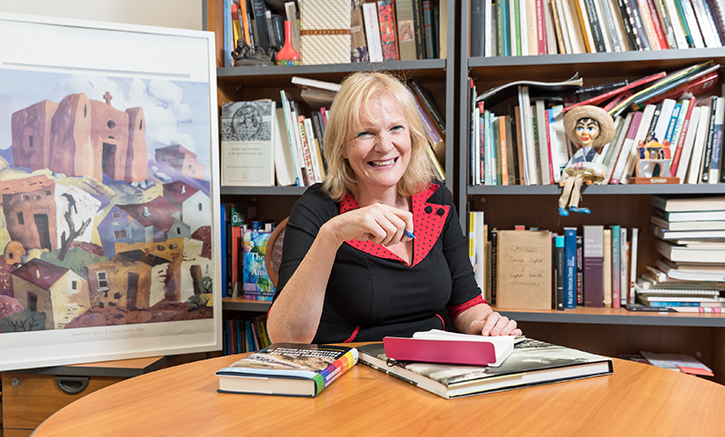- Home
- About the EDI Unit
- News & Events
- Publications
- EDI Training Hub
- Equality Committee
- Gender Identity and Expression
- Sexual Violence and Harassment Framework
- Speak Out
- University of Sanctuary
- Athena SWAN
Professor Nuala Finnegan, Department of Spanish, Portuguese & Latin American Studies
Nuala Finnegan, Professor of Spanish

College: Arts, Celtic Studies & Social Sciences
School: Languages, Literatures & Cultures
Research Interests: Modern and contemporary Mexican & Mexican American cultural studies with a particular focus on gender
IRIS profile: http://publish.ucc.ie/researchprofiles/A018/nualafinnegan
What first attracted you to your academic discipline?
Spending a year in Valencia, Spain as part of my degree was a truly transformative experience, which opened my eyes to the rich panorama of new worlds in Spain and Latin America, worlds that I could access through acquiring a deep knowledge of both the language and the cultures.
How were you drawn to your current research interests?
I was drawn to my current research interests, which look at literary and visual representations of violence against women and the ethical issues they raise as the result of field-work and visits to the US-Mexico border region and my interest in gender and the role of women more widely. Since completing a PhD on the pioneering work of writer Rosario Castellanos with her concerns for the role of women and her sensitive explorations of the cruel realities of the indigenous communities in southern Mexico, I have been interested in the ways in which women intervene in the cultural sphere as film directors, writers, theatre practitioners, film-makers and photographers in order to imagine other realities and modes of being.
What professional achievements do you consider particularly rewarding?
My proudest academic moment was to see my student, Patrick Aylward graduate with a PhD at the age of 83. Sadly, Pat is no longer with us but his and his wife, Phil's commitment and energy have remained a source of inspiration to me. In terms of other achievements, I was delighted to be involved in Outposts, an exhibition in the Glucksman gallery focusing on global borders and national boundaries, and was particularly honoured to receive an award from the Mexican government in 2011 in recognition of my role in the dissemination of Mexican culture and my research contribution.
Have you had professional role models? What impact did they have on you?
Most of my role models have been my peers and I am constantly inspired, encouraged and sustained by contact with my colleagues in the Department, the School, the University and, of course, the wider community of scholars with whom I dialogue.
What aspects of your work do you find most rewarding?
I find most aspects of the job rewarding but postgraduate supervision, research, teaching and what you might call 'leadership' in terms of creating new programmes, working on new initiatives, collaborating with colleagues on new projects: all of these things bring special rewards.
Any details you wish to share about how being female has impacted upon your career (positively or negatively)?
As a female academic, I have witnessed great curricular change. As an undergraduate in the 1980s, I completed an entire undergraduate degree without encountering a single female author of literature in either Hispanic or Irish literature. That this was a profoundly alienating experience - being asked to accept the idea that only men had produced objects worthy of study - only became apparent at a later stage of my academic and personal development. I am happy to say that now our students have a much broader perspective and the curriculum is enriched as a result. Women face great barriers in the workplace: the overwhelming evidence of structural inequality in our universities means that we must all own this issue and work towards overcoming the problems.
Academic careers present specific challenges in achieving balance, whether between research, teaching and administration, or in work/life balance. What advice might you give a student/younger colleague/your 18-year old self?
I think many academic colleagues struggle to find the dividing line between work and life. And also the difficulty of putting in boundaries that help to protect. Because of its very nature, research is never finished and there are always projects - new and unfinished ones - always pressures to produce that can lead to high levels of anxiety and frustration. I always speak to younger colleagues about protecting their personal time, of the importance of establishing clear boundaries, respect for core hours of work. I also think that the recognition of limitations and the acknowledgement of achievement is really important. To my 18-year old self, I would say not to be so worried about being liked and accepted.
